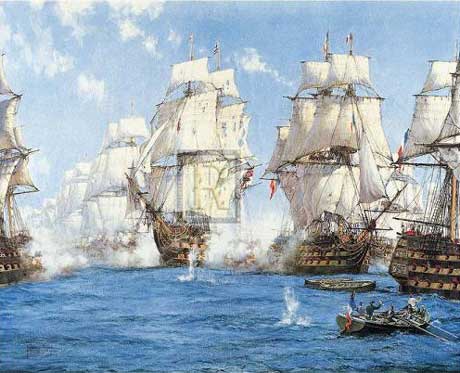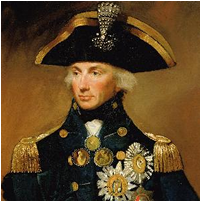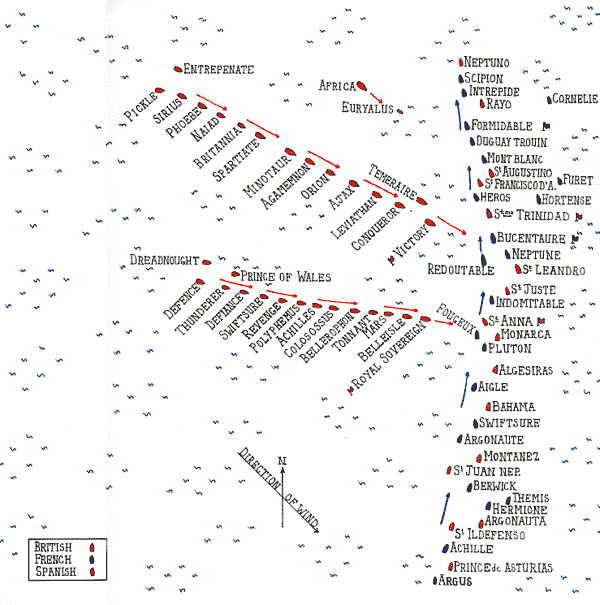October 21, 2005
Trafalgar Bicentennial

(Image borrowed from BritishBattles.com)
Today is the 200th Anniversary of the Battle of Trafalgar, one of the greatest naval engagements in history, in which Admiral Viscount Lord Nelson smashed a combined French and Spanish fleet under Admiral Villenueve and thus utterly dashed whatever hope Napoleon had ever had for invading England. While the battle was one of the signal victories in the annals of the Royal Navy, the success was marred by the death of Nelson himself, cut down on the deck of HMS Victory by a sniper in the rigging of the French ship Redoubtable.

Nelson in full regalia
The battle opened with the Royal Navy divided into a double column of attack aimed at piercing and overwhelming the Franco-Spanish line at two points, and at the same time cutting off the van of the Allied fleet, which would take some considerable time to turn around and sail back into the fight:

This is actually the reverse of a maneuver sometimes called "crossing the enemy's T" and is extremely risky: the majority of a sailing ship's cannons are ranged along her sides and the line of ships broadside on to the attack is able to bring a tremendous amount of gunnery to bear, while only the foremost ships of the attacking column could at first fire. Furthermore, on the day of the battle the winds were quite light and the progress of Nelson's attacking squadrons very slow. Had Admiral Villeneuve been looking for a genuine knock-down, drag-out fight, he was in a perfect position to start one. However, the truth of the matter is that all the Franco-Spanish fleet wanted was to get away from Nelson and escape to the French ports on the English Channel, there to guard the invasion flotilla.
As the Royal Navy smashed into the line, a series of fierce close-quarters battles took place, during which superior British gunnery and seamanship took apart the enemy. By the end of the battle, 22 French and Spanish ships had been sunk or captured while, although many suffered damage, not a single British ship was lost.
Now, Villeneuve certainly had his orders, and Napoleon's first, last and only interest in his navy was its ability to keep the British off his invasion flotilla, but I also think this battle says something both about the relative qualities of the two fleets and about Nelson himself. First, it is important to understand that the French Navy in particular suffered under an enormous psychological as well as skills disadvantage. It had been every bit as competent as the Royal Navy prior to the French Revolution (see A.T. Mahan's Influence of Sea Power Upon History, 1660-1783 on this subject), but a great part of the seasoned, experienced officer class had been wiped out during that time, to be replaced by Jacobin toadies who, whatever their political zeal, had no real understanding of naval warfare. When Revolutionary France declared war against England in the mid-1790's, its navy promptly and repeatedly got thrashed, despite on many occassions outgunning and outmanning its Royal Navy adversaries. This largely shaped the outlook of both fleets that lasted right on into the Napoleonic era - the British became used to winning almost as a matter of course, no matter what the odds. The French, on the other hand, tended to be timid and hesitant, what is nowadays called "risk averse".
Then there was the skills issue: At the outbreak of the Napoleonic War, the British promptly blockaded the major French ports, bottling up large parts of the French fleet. Thus, while the Royal Navy had to keep to the seas in all seasons and weathers, constantly honing its skills, most French ships sat idling in port, their crews gaining very little experience beyond the occasional tour around the harbor.
Then there was Nelson himself, who was both a product and a cause of these circumstances. While we have become hard-bitten and cynical about dashing, flamboyant heroes in our day, Nelson was about as close to the real thing as one could imagine - supremely confident in the skills of himself and his men, daring to the point of occassional recklessness, and utterly convinced of the right of what he was doing. Furthermore, he sought to instill these ideas in those around him - his reference to the captains of the Royal Navy as a "Band of Brothers" encouraged such levels of professionalism, confidence and aggression in his fellow commanders that, really, the Royal Navy was virtually unstoppable until the rise of the German challenge in the early part of the 20th Century. And when Nelson flew his famous signal just before the battle, "England Expects That Every Man Will Do His Duty," it was as much an exhortation, an appeal to the Fleet's pride, as it was a command. The results speak for themselves.
UPDATE: The Big Hominid over at Naked Villainy posts more on close quarter combat tactics, French psychology and the "Nelson Touch".
UPDATE The SECOND: And of course, what would Trafalgar posting be without Kathy's Nelson pic?
UPDATE The Third: Coming Anarchy has more, including a little animation of the battle which both nicely demonstrates Nelson's tactics and also somewhat chillingly depicts the scope of his victory. Also, here is another link that has some detail of the individual encounters within the melee.
And if you're really into this business, here's the roll of the 1640 British officers and seamen who took part in the battle.
UPDATE The Fourth: Where I should have started, probably. Tim Worstall has thoughts from the Royal-Navy-family-member perspective and more links about this year's celebrations and what Nelson's victory meant.
I should probably pay more attention to the art of war, with its logic and psychology, but I don't quite have the attention span for it. I do like that painting best of Nellie, though. Very handsome, befitting the Tom Cruise (pre-Eyes Wide Shut) of his day. And not afraid to ask for a kiss when he wanted one, too.
Posted by: tee bee at October 21, 2005 01:56 PM





